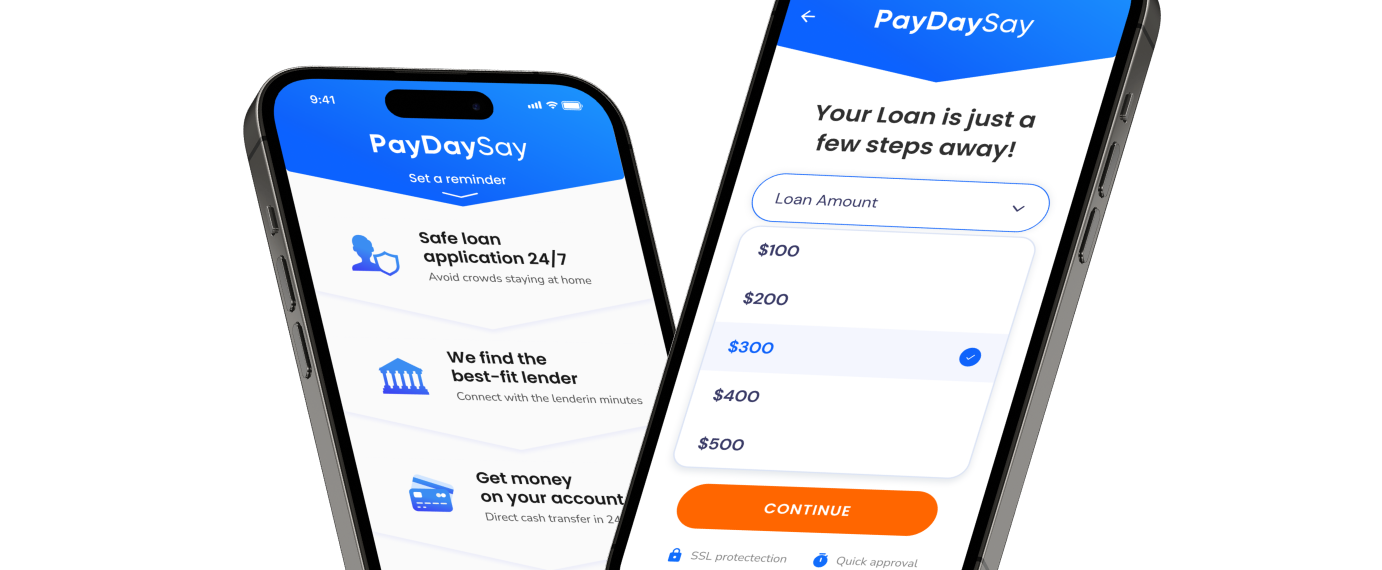At PayDaySay, we understand that individuals on disability face unique financial challenges. That’s why we’re committed to offering loans for disabled people, providing a financial lifeline when it matters most. Whether you’re dealing with unexpected medical bills, daily living expenses, or any other financial hurdles, our tailored disability loans are designed to meet your needs.
With a simple disability loan application process and options for every credit type, including loans for people on disability with bad credit, getting the financial support you need has never been easier.
Navigating the Process: Applying for a Personal Loan
Applying for a personal loan when you’re on disability involves a few straightforward steps. Here’s a simplified guide to help you navigate the process:
- Assess Your Needs. Determine why you need the loan (e.g., home improvements, medical bills) and how much you need to borrow.
- Check Your Income. Ensure your disability benefits (such as SSDI or SSI) are stable, as lenders will consider this your income. Gather your income documentation, including disability payments statements.
- Review Your Credit. Check your credit score, as this will affect your loan terms and interest rates. Even if you have a lower score, there are loans available for people with scores under 500.
- Research Lenders. Look for lenders that offer loans for disabled people. This includes online lenders, credit unions, and specialized programs that provide personal loans for disabled individuals. Some payday lenders offer loans specifically for those receiving social security income or for disabled veterans.
- Compare Loan Options. Evaluate the interest rates, repayment terms, and any additional fees of different loans. Consider both traditional personal loans and disability-specific options, like short-term disability loans or loans that accept disability benefits as income.
- Apply Online or In-Person. Many lenders allow you to apply online, making it convenient to secure a loan from home. Ensure you have all necessary documentation, such as ID, income proof, and any other required information.
- Read Terms Carefully. Before accepting the loan, thoroughly review the loan agreement. Pay close attention to the repayment schedule, interest rates, and any penalties for late payments.
- Accept the Loan. If the terms are acceptable and meet your needs, accept the loan. Funds are typically deposited directly into your bank account.
By following these steps and carefully considering your options, you can successfully apply for a personal loan while on disability. Remember, it’s important to choose a loan that fits your financial situation and repayment ability.
Understanding Costs: A Guide to Types of Disability Loans
Understanding the costs and options available for disability loans is crucial for managing finances effectively. Disability loans are designed to help individuals who receive Social Security Disability Insurance (SSDI) and Supplemental Security Income (SSI) meet their financial needs. These loans come in various forms, catering to the unique situations of disabled persons.
- Social Security Disability Loans. These are loans specifically for individuals receiving SSDI benefits. They can be used for any expense and are often considered when awaiting the start of benefits.
- Supplemental Security Income (SSI) Loans. Similar to SSDI loans, these are tailored for recipients of SSI, offering financial assistance to those on a limited income.
- Disability Payday Loans. For immediate, short-term cash needs, disability payday loans provide quick funds. However, they come with high interest rates and are suitable for urgent situations.
- Installment Loans. Offering a structured repayment plan and installment loans for disabled individuals allows for manageable monthly payments over a set period.
- Loans with Social Security Income. Many lenders accept social security income as a valid source of income, offering loans to individuals on disability benefits. These loans are considered the steady income provided by SSI or SSDI benefits.
- No Credit Check and Bad Credit Loans. For those with poor credit scores or who want to avoid a credit check, some lenders offer loans without requiring a traditional credit review.
Each type of disability loan serves a specific purpose, from covering daily expenses and medical bills to larger purchases. It’s important to carefully consider the terms, interest rates, and repayment options of these loans to ensure they meet your financial situation and needs.
Whether you’re looking to get a loan on disability with no job or seeking financial assistance while waiting for disability benefits to commence, there are options available to support your financial well-being.
Pros and Cons of Disability Loans
Loans while waiting for disability offer a financial lifeline to individuals living with disabilities, providing them with the necessary funds to cover various expenses. However, like any financial product, they come with their own set of advantages and disadvantages.
Pros
- Accessibility. Disability loans are accessible online 24/7, making it convenient for disability recipients to apply for a loan without leaving their home.
- Wide Range of Options. There are various types of loans available, including short-term disability loans, personal loans for credit scores under 500, and loans specifically designed for medical bills or to cover expenses while waiting for disability benefits.
- Acceptance of Disability Payments. Disability payments are accepted by many lenders as a reliable source of income, allowing individuals who receive SSI or SSDI benefits to qualify for a personal loan.
- Flexible Terms. Loans for disabled people often come with flexible repayment terms, enabling borrowers to find a loan program that best suits their financial situation.
- Immediate Financial Relief. For urgent financial needs, disability payday loans and quick loans provide immediate loan funds, which can be crucial for covering unexpected expenses.
Cons
- High-Interest Rates and Fees. Loans, especially payday loans for disabled individuals and those with no job, can come with high-interest rates and fees, making repayment challenging for people on a fixed income.
- Risk of Debt Cycle. Short-term loans can lead to a cycle of debt if not managed carefully, particularly for those with limited income.
- Impact on Benefits. Borrowing a loan may affect eligibility for certain disability benefits. It’s important to understand how receiving a loan could impact your benefits.
- Credit Score Requirements. While there are loans available for those with poor credit, the terms are often less favorable. Some loan options still require meeting a minimum credit score requirement.
- Secured vs. Unsecured Loans. Secured loans may offer lower interest rates but require collateral, which not everyone can provide. Unsecured loans, while more accessible, often come at a higher cost.
Before taking out a disability loan, it’s important to weigh these pros and cons carefully. Consider your financial situation, the necessity of the loan, and your ability to repay the loan on time. Exploring other resources for people with disabilities, including grants and assistance programs, might provide a more sustainable financial solution.
Alternatives to a Disability Loan
When seeking financial solutions beyond a disability loan, several alternatives exist that cater specifically to the needs of disability recipients, including those on limited income or receiving benefits like SSI and SSDI. These alternatives provide viable options for managing financial obligations without relying solely on traditional disability loans online or short-term disability loans.
Government Disability Loans and Grants
Directly targeting people who receive disability, these funds offer support for medical bills and living expenses and adapt living spaces to enhance accessibility. Unlike loans for disabled people, these grants do not require repayment, making them an ideal choice for loans for poor people or those awaiting disability benefits.
Social Security Benefits
For those receiving disability payments, exploring additional benefits through the Social Security Administration can provide supplementary income. This direct government disability income supports those who might otherwise look into disability payday loans or loans for someone on disability.
Non-Profit Assistance
Numerous organizations offer grants and assistance specifically designed for loans disabled people might need. These entities understand the unique challenges faced by people with disabilities, providing targeted help without the stringent conditions of a disability loan online.
Credit Union Loans
Specialized loan programs from credit unions often feature more favorable terms for loans for those on disability, including lower interest rates and flexible repayment schedules. These can be an excellent alternative to online payday loans for disabled people or high-interest personal loans for credit scores under 500.
Peer-to-Peer Lending Platforms
Offering a modern approach to lending, these platforms allow individuals to get a loan with no job directly from investors. This can be a more accessible option for those who may not qualify for traditional bank loans due to disability or limited income.
Home Equity and Co-signed Loans
Utilizing home equity or getting a loan with a cosigner can offer access to funds at better rates and terms than standard disability loans. This approach is beneficial for covering larger expenses without the high costs associated with disability payday loans or loans for medical bills.
Financial Planning and Counseling
Professional advice can help manage the funds you receive from disability benefits more effectively, reducing the need to take out a loan. Counseling services can provide strategies for maximizing income and managing debt, offering a solid foundation for financial stability without relying on loans for disabled people or SSDI loans.
By exploring these alternatives to a disability loan, individuals can find financial relief that accommodates their specific needs and circumstances. From government assistance to innovative lending solutions, these options provide a broader safety net for those on disability, helping to cover expenses without the added burden of loan repayments.
Credit Requirements Unveiled: Getting Disability Loans with Bad Credit
Navigating the terrain of acquiring disability loans with bad credit can be less daunting than it appears. For people on disability benefits, understanding that there are lenders who specifically cater to their needs can be a relief.
These lenders recognize that disability payments are a reliable source of income and are thus accepted when applying for a disability loan, which is essentially a personal loan tailored to individuals receiving such benefits.
A vital feature of these loans is that they often come with incentives; for instance, personal loans reward you for good repayment history, making them an attractive option for those who are diligent with their payments. This can be particularly beneficial for loan borrowers looking to improve their credit scores. Moreover, personal loans can offer flexibility, such as providing credit card cash advances on credit cards or funding major expenses through home equity loans, without jeopardizing the benefits that individuals rely on.
However, it’s essential to be mindful of how taking out a loan could impact your disability benefits. Certain types of loans, significantly those considered income, may affect your benefits. Therefore, when seeking a loan, especially if your credit is not ideal, it’s crucial to look for options that suit your income level and financial situation, ensuring that you qualify without risking your financial stability.
Remember, while the need for a credit score cannot be entirely bypassed, many payday loan options and other lending solutions are designed to accommodate the unique circumstances of those on disability benefits.
Discovering the Best Sources for Personal Loans for People on Disability
Discovering the best sources for personal loans for people on disability requires understanding what is a disability loan, where to look, and what makes a loan suitable for your needs.
A disability loan is a personal loan specifically designed for individuals who are receiving disability benefits, such as SSI benefits, and may need financial assistance while waiting for these benefits to start or to cover expenses in the interim.
One of the primary sources for these loans is online lenders, who offer online loans 24/7. These platforms provide the convenience of applying for a loan at any time, making it easier for those who might have mobility or transportation challenges.
They often have a streamlined loan approval process, which can benefit individuals looking to get a personal loan quickly, especially in short term disability loans where the financial need is immediate.
Banks and credit unions also offer loans for disability benefits, including lines of credit, which might suit those who prefer a more traditional banking relationship. These institutions may be able to offer the best loan options regarding interest rates and loan payments terms, particularly for those with a good banking history.
When applying for these loans, it’s crucial to consider the loan’s terms, such as the credit limit, the interest rates, and the repayment schedule, which often coincides with the month you receive your disability benefits. Ensuring that the loan payments are manageable within your budget is essential, especially since disability benefits are typically fixed incomes.
Ultimately, the best source for a personal loan will depend on your specific financial situation, how quickly you need access to funds, and your creditworthiness. Whether you’re looking for a loan for disability benefits or a line of credit, there are options available that can accommodate the unique financial circumstances of individuals receiving disability benefits.
Choosing PayDaySay: The Smart Choice for Your Disability Loan
Choosing PayDaySay for your disability loan offers a smart and tailored approach to financial assistance for individuals on disability benefits. PayDaySay understands the unique financial situations of people receiving disability benefits, making it an ideal platform for those looking to take out a personal loan.
Unlike traditional lenders that may not offer personal loans to individuals on disability or have stringent requirements, PayDaySay welcomes disability payments as accepted income, ensuring that loans are accessible to a wider range of borrowers.
PayDaySay’s approach to disability loans is personal and considerate. The platform offers various loan options, including auto loans and personal loans, designed to meet the diverse needs of individuals on disability.
These loans are crafted to cover expenses where disability benefits may not suffice, such as unexpected medical bills or home equity projects. Importantly, PayDaySay rewards borrowers for good repayment habits, enhancing the borrowing experience for disabled borrowers.
The application process with PayDaySay is straightforward, requiring basic income information to qualify. This inclusivity means that even if your credit score isn’t perfect or your income sources are unconventional, you still may qualify for a loan.
Additionally, PayDaySay’s transparent terms help ensure that taking out a loan doesn’t negatively affect your existing disability benefits, providing peace of mind for borrowers concerned about maintaining their financial stability.
In summary, PayDaySay stands out as a compassionate lender in the disabled world, offering financial solutions that are both accessible and rewarding. For individuals on disability benefits seeking a reliable source of additional funds, PayDaySay represents a smart choice, blending flexibility, understanding, and supportive financial services.













 on your homescreen
on your homescreen